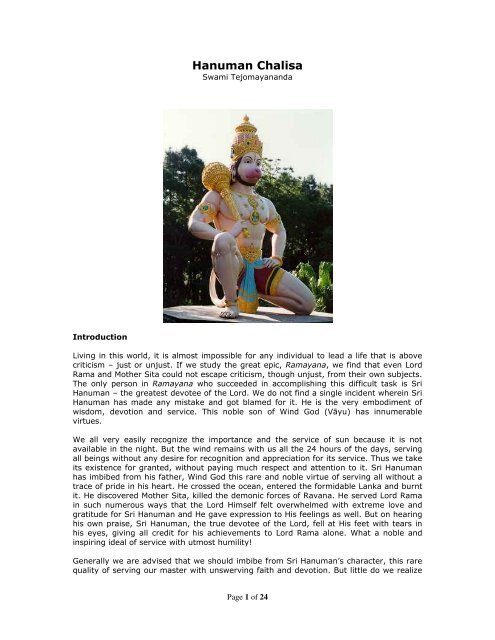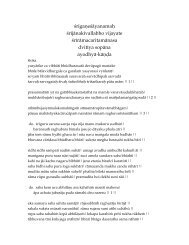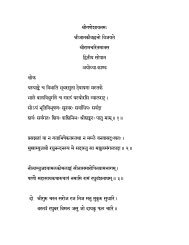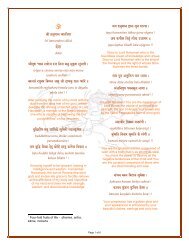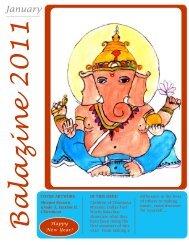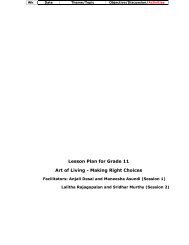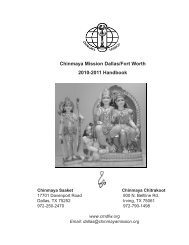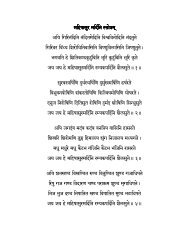Hanuman Chalisa with Full English Description - About Bhadra Maruti
Hanuman Chalisa with Full English Description - About Bhadra Maruti
Hanuman Chalisa with Full English Description - About Bhadra Maruti
Create successful ePaper yourself
Turn your PDF publications into a flip-book with our unique Google optimized e-Paper software.
Introduction<br />
<strong>Hanuman</strong> <strong>Chalisa</strong><br />
Swami Tejomayananda<br />
Living in this world, it is almost impossible for any individual to lead a life that is above<br />
criticism – just or unjust. If we study the great epic, Ramayana, we find that even Lord<br />
Rama and Mother Sita could not escape criticism, though unjust, from their own subjects.<br />
The only person in Ramayana who succeeded in accomplishing this difficult task is Sri<br />
<strong>Hanuman</strong> – the greatest devotee of the Lord. We do not find a single incident wherein Sri<br />
<strong>Hanuman</strong> has made any mistake and got blamed for it. He is the very embodiment of<br />
wisdom, devotion and service. This noble son of Wind God (Vāyu) has innumerable<br />
virtues.<br />
We all very easily recognize the importance and the service of sun because it is not<br />
available in the night. But the wind remains <strong>with</strong> us all the 24 hours of the days, serving<br />
all beings <strong>with</strong>out any desire for recognition and appreciation for its service. Thus we take<br />
its existence for granted, <strong>with</strong>out paying much respect and attention to it. Sri <strong>Hanuman</strong><br />
has imbibed from his father, Wind God this rare and noble virtue of serving all <strong>with</strong>out a<br />
trace of pride in his heart. He crossed the ocean, entered the formidable Lanka and burnt<br />
it. He discovered Mother Sita, killed the demonic forces of Ravana. He served Lord Rama<br />
in such numerous ways that the Lord Himself felt overwhelmed <strong>with</strong> extreme love and<br />
gratitude for Sri <strong>Hanuman</strong> and He gave expression to His feelings as well. But on hearing<br />
his own praise, Sri <strong>Hanuman</strong>, the true devotee of the Lord, fell at His feet <strong>with</strong> tears in<br />
his eyes, giving all credit for his achievements to Lord Rama alone. What a noble and<br />
inspiring ideal of service <strong>with</strong> utmost humility!<br />
Generally we are advised that we should imbibe from Sri <strong>Hanuman</strong>’s character, this rare<br />
quality of serving our master <strong>with</strong> unswerving faith and devotion. But little do we realize<br />
Page 1 of 24
that before doing so, it is of extreme importance to know who should really be our<br />
Master. He who is the Lord of the total universe and in serving whom our potential<br />
divinity comes to shine forth; He alone can be our true Master. This truth is seen<br />
revealed in the life of Sri <strong>Hanuman</strong>. Before meeting Lord Rama he was serving Sugriva<br />
but his powers remained dormant at the time and Sugriva was not able to bring them out<br />
as Lord Rama did by His sheer grace. We see that Sugriva himself was fraught <strong>with</strong><br />
mortal fear of death at the hands of his own brother Vali, and was dependent on Sri<br />
<strong>Hanuman</strong> for his own protection. How could such a person ever be anyone’s true Master?<br />
On the other hand when Sri <strong>Hanuman</strong> saw Lord Rama for the very first time he<br />
recognized his Master immediately and, thereafter, not only himself became His loyal and<br />
devoted servant but also made Sugriva follow his example. As soon as Sugriva<br />
surrendered himself to the lotus feet of Lord Rama, he received the fruit of his devotion.<br />
In Lanka also, the she-demon Lankini and Vibhishana were serving Ravana, the mighty<br />
but atrocious king. They were under the same notion that they should serve their Master,<br />
whoever he may be. It is only Sri <strong>Hanuman</strong> who made them realize their mistake. After<br />
recognizing this, they both became devotees of Lord Rama.<br />
Thus, we see that neither a weakling like Sugriva nor a mighty person like Ravana can<br />
ever be a true Master. Lord Rama alone can be that Master who is great, not because He<br />
keeps all beings under His control like Ravana but because He makes His devotees<br />
greater than Himself!<br />
May we all come to recognize Lord Rama as our Master and serve Him in the attitude of<br />
His great devotee Sri <strong>Hanuman</strong>? May we ever revel in singing the holy name of the Lord<br />
– Sri Ram Jaya Ram Jaya Jaya Ram!<br />
om shrī ganeshāya namah<br />
<strong>Hanuman</strong> <strong>Chalisa</strong> is the most popular composition of the great Saint Goswami Tulsidas,<br />
the author of Tulsi Ramayana. He composed <strong>Hanuman</strong> <strong>Chalisa</strong> when he was very sick. He<br />
sang the praise of Sri <strong>Hanuman</strong> and it is said that he recovered from his illness. The<br />
significance of singing the glories of the Lord is to purify your speech and mind. It is<br />
impossible to sing all His glories because they are infinite. You should chant those of His<br />
glories that are dear to you. In the Sundarakanda of Tulsi Ramayana, Saint Tulsidas sings<br />
the glory of Sri <strong>Hanuman</strong>:<br />
Atuiltblxam< hemzElaÉdeh<<br />
dnujvnk«zanu< }ainnam¢g{ym!,<br />
sklgu[inxan< vanra[amxIz<<br />
r"upitiàyÉ´< vatjat< nmaim.<br />
atulitabaladhämaà hemaçailäbhadehaà<br />
danujavanakåçänuà jïäninämagragaëyam |<br />
sakalaguëanidhänaà vänaräëämadhéçaà<br />
raghupatipriyabhaktaà vätajätaà namämi ||<br />
I salute the son of Wind God, the abode of immeasurable strength, possessing a body<br />
shining like a mountain of gold, a fire to consume the forest of the demon race, the<br />
Page 2 of 24
foremost among the wise, storehouse of every excellence, the chief of the monkeys, Lord<br />
Rama’s noble devotee!<br />
The first attractive attribute that you see in Sri <strong>Hanuman</strong> is that he is the abode of<br />
immeasurable and incomparable strength that is not merely physical but also has a<br />
splendor (tejas) in it. His splendor is like a golden mountain. It is a rare quality. He uses<br />
his strength not to scare ordinary of weak people but to destroy those who give trouble<br />
to saintly persons. He not only has the power but also is considered as a wise, noble soul<br />
(jnānin). His language as well as the feelings are pure.<br />
The most admirable virtue of Sri <strong>Hanuman</strong> is his politeness. Ravana was strong but he<br />
had pride. Such a person does not really command any respect. Sri <strong>Hanuman</strong> is truly the<br />
king of all Vānara-s. To him, Lord Rama is very dear. Also we can say that Sri <strong>Hanuman</strong><br />
is the favorite devotee of Lord Rama. When one has love for the Lord, Lord embraces His<br />
devotee in thousand ways.<br />
Sri <strong>Hanuman</strong> brought life to all. He helped Sugriva get rid of his fear of Vali and he<br />
inspired Vibhishana who came away from Ravana to surrender at the feet of the Lord. He<br />
saved the life of Mother Sita, by conveying the message of the Lord to her. He brought<br />
the sanjīvani plant and saved the life of Lakshmana. He proceeded to Ayodhya, much<br />
before Lord Rama and conveyed the message of Lord’s arrival to Bharata, who was ready<br />
to immolate himself then. It is the glory of Sri <strong>Hanuman</strong> in the form of <strong>Hanuman</strong> <strong>Chalisa</strong>.<br />
<strong>Hanuman</strong> <strong>Chalisa</strong> is sung in various parts of India <strong>with</strong> great love and devotion. Some<br />
people chant it as their daily prayer. People believe that if they have illness or adversity,<br />
chanting of <strong>Hanuman</strong> <strong>Chalisa</strong> seven times or one hundred times will relieve them of their<br />
distress. There are others who consider Saturday or Tuesday to be dedicated to Sri<br />
<strong>Hanuman</strong> and they spend the day in thinking about the glories of Sri <strong>Hanuman</strong>, going to<br />
the temple and chanting <strong>Hanuman</strong> <strong>Chalisa</strong>. Thus, we see that this great composition of<br />
Saint Tulsidas has become a part of the culture and religious beliefs of a large number of<br />
people in India. The word <strong>Chalisa</strong> means forty. This composition has forty verses in praise<br />
of Sri <strong>Hanuman</strong>. Those who are familiar <strong>with</strong> the story of Ramayana know his greatness.<br />
As we read individual verse in detail, we shall appreciate his various qualities namely<br />
love, devotion, service, valor etc.<br />
In life, it is almost impossible for a person to remain free from blemish. Whether right or<br />
wrong, criticisms and accusations are leveled against everyone. It is impossible to escape<br />
this and no one is immune from it. Even Lord Rama and the divine Mother Sita are not<br />
spared. Lord Rama was an incarnation of righteousness and Mother Sita was the<br />
incarnation of purity. They also are unfairly blamed and criticized. But there is one<br />
character in Ramayana who is above all criticisms and that is Sri <strong>Hanuman</strong>. He is a great<br />
devotee and totally free from all faults and blemish. We shall see this in more detail as<br />
we study the text.<br />
daeha<br />
dohä<br />
ïIgué crn sraej rj inj mnu muk…é suxair,<br />
brn^~ r"ubr ibml jsu jae dayk… )l cair.<br />
Page 3 of 24
çréguru carana saroja raja nija manu mukuru sudhäri |<br />
baranaüð raghubara bimala jasu jo däyaku phala cäri ||<br />
With a spotless (serene) mind, purified by the dust of the lotus feet of Guru, I now<br />
(proceed to) describe the unblemished glory of Sri <strong>Hanuman</strong>; the most exalted one of<br />
Raghu’s family, who is capable of bestowing the four fruits (purushārtha-s) on his<br />
devotees.<br />
<strong>Hanuman</strong> <strong>Chalisa</strong> is composed in the Avadhi language, which is a dialect of Hindi and is<br />
spoken in Ayodhya (in Uttar Pradesh, India), where Lord Rama was born. Though an<br />
offshoot of Hindi, it has been modified over the years where even students of Hindi may<br />
have trouble in understanding a lot of the Avadhi words. The word baranau means – I am<br />
going to describe. It comes from the Sanskrit verb varnan, ‘to describe’. Saint Tulsidas<br />
says that in these verses he is going to describe the holy, pure noble glories (bimala<br />
jasu) of raghuvar. Lord Rama belonged to the dynasty of Raghu (raghuvamsa). Raghu<br />
was a great king and the entire dynasty was named after him. Raghuvar means the<br />
supreme, the best among the descendants of Raghu dynasty – Lord Rama. This particular<br />
verse is found in Ayodhyākanda of Ramacharita Manas. There we understand that it<br />
refers to the glories of Lord Rama. In fact in the second part of Ayodhyākanda, the<br />
glories of Bharata (younger brother of Lord Rama) are sung. So this verse could also<br />
refer to Bharata as raghuvar since he was a noble brother. Even though <strong>Hanuman</strong> <strong>Chalisa</strong><br />
praises Lord Rama, it is essentially being sung in praise of Sri <strong>Hanuman</strong>. Why would then,<br />
Saint Tulsidas address Sri <strong>Hanuman</strong> as raghuvar? As we all know, he was not born in the<br />
Raghu dynasty. He was in the form of a monkey. But there is a beautiful interpretation<br />
for this. In Tulsi Ramayana, it is mentioned that he was the adopted son of Lord Rama<br />
and Mother Sita. When Sri <strong>Hanuman</strong> went to Lanka to meet Mother Sita, she recognized<br />
him as the greatest devotee of Lord Rama and addressed him as suta, my son. In turn,<br />
Sri <strong>Hanuman</strong> called her as janani, mother (one who gives birth). And when Sri <strong>Hanuman</strong><br />
returned from Lanka, Lord Rama also addressed him as ‘son’. It is interesting that Sri<br />
<strong>Hanuman</strong> met Lord Rama first but Mother Sita was the one who addressed him first as<br />
son and developed that relationship <strong>with</strong> him. In human life also it is mother who gets<br />
close to the child first and the relationship of father develops later.<br />
Thus, Lord Rama and Mother Sita’s son becomes ‘one who belongs to the dynasty of<br />
Raghu – raghuvamshi. And because of the noble, divine qualities of Sri <strong>Hanuman</strong>, he is<br />
referred to as raghuvar, the supreme and the best. However, Sri <strong>Hanuman</strong> gives all the<br />
credit for his success to Lord Rama. In fact the two are inseparable. Hence these verses<br />
describe the glories of the supreme descendants of Raghu.<br />
Saint Tulsidas then goes on to say, “I am describing the glories of Sri <strong>Hanuman</strong>, because<br />
he was not an ordinary person. Don’t take him to be like an ordinary king or divine<br />
minister or dictator. He is greater than all those. Singing his glories gives you all the four<br />
goals of life. The four goals are: dharmah arthah, kāmah and mokshah.<br />
Arthah refers to wealth and prosperity and kāmah means worldly joy of sense pleasures.<br />
Some people may be very rich but are not able to enjoy their wealth. They may be so<br />
sick that they can’t even eat. Their breakfast may be only medicines! What use is such<br />
wealth? Others may have wealth and joy, but do not perform any meritorious deeds,<br />
dharmah. They do not do things for others and such people suffer in life. Singing the<br />
glories of Sri <strong>Hanuman</strong> gives you dharmah and also punyah (merit) to enjoy heaven. But<br />
the most important goal of man's life is liberation from the sufferings of the cycle of birth<br />
and death, mokshah Sri <strong>Hanuman</strong> can grant this great goal also to us.<br />
How does one prepare oneself to sing the glories of Sri <strong>Hanuman</strong>? It is by purifying one’s<br />
mind. A clean, pure mind will be able to relate <strong>with</strong> the Lord and feel His presence<br />
Page 4 of 24
everywhere. Saint Tulsidas says, shrī guru charana saroja raja nija mana mukura<br />
sudhāri. The word sudhāri signifies perfecting purifying and cleaning. Nijamanu mukuru<br />
means ‘the mirror of my mind.’ I will clean the mirror of my mind so it will reflect the<br />
glories of the Lord. Only in a clean mirror the reflection is clear and in the mind-mirror,<br />
Sri <strong>Hanuman</strong>’s glories can shine. How will I clean this mind-mirror? Guru charana saroja<br />
raja – <strong>with</strong> the dust of my teacher’s lotus feet. By surrendering myself at the feet of my<br />
teacher and in service to him, I will be able to cleanse my mind of all impurities.<br />
buiÏhIn tnu jainke suimraE< pvnk…mar,<br />
bl buiÏ ib*a de÷ maeih< hr÷ kles ibkar.<br />
buddhihéna tanu jänike sumirauà pavanakumära |<br />
bala buddhi bidyä dehu mohià harahu kalesa bikära ||<br />
Knowing that I am ignorant, I pray to you (Sri <strong>Hanuman</strong>) the son of Wind God, to bless<br />
me <strong>with</strong> strength, wisdom and discriminating knowledge. Banish (all) my afflictions.<br />
Sumirau is derived from the Sanskrit word smarana – ‘to remember’. In these local<br />
dialects, the difficult Sanskrit words become sweeter and easier to pronounce. The verse<br />
says, I remember pavana kumārah, son of the Wind god. Bala buddhi bidyā dehu mohi –<br />
bless me <strong>with</strong> strength that includes physical, moral and strength of character. Vidyā<br />
means knowledge and buddhi is the faculty <strong>with</strong> which we gain knowledge. If I do not<br />
have this faculty, how can I know anything or learn? A blind man has physical eyes, but<br />
does not have the faculty of seeing. To gain knowledge, I must have the faculty of<br />
knowing and understanding and also I must use it. In this world every man is blessed<br />
<strong>with</strong> intellect (buddhih), but not everyone is intelligent (buddhimāna). A wise man not<br />
only learns, but also uses that knowledge to help him and others. One man was asked,<br />
‘Why do you always act so foolish, why don’t you use your brains?’ He said, ‘God has<br />
given me a limited amount of intellect. I have to live for 70 years. If I use it all right now,<br />
it will finish by the time I get older. So, I have to conserve it and use it sparingly!’<br />
People do not use their intellect and this is the reason for bondage. Even if they do use it,<br />
it is only at the worldly, superficial level. They do not think about themselves, the truth<br />
behind this life or this world. Saint Tulsidas says: ‘Bless me <strong>with</strong> strength and<br />
knowledge.’ What will this knowledge do? Harahu kalesha bikāra – this knowledge alone<br />
can remove my sufferings. Vikāra means change or modification which we are afraid of<br />
and do not want to accept. Kalesa (in Sanskrit, kleshah) here refer to afflictions that<br />
cause misery, perversions and negative tendencies. Five kinds of afflictions are<br />
mentioned in the scriptures:<br />
1. Avidyā – ignorance<br />
2. Asmitā – ego (the product of ignorance)<br />
3. Rāgah – things I like<br />
4. Dveshah – things I dislike, and<br />
5. Abhiniveshah – fear of death.<br />
Everyone suffers from these five afflictions. The more likes and dislikes you have, the<br />
more unhappy you become. If you get the things you like, you are happy and if not or if<br />
you get things you dislike that makes you unhappy. However, it is not always possible to<br />
have around you, the objects, people and places that you like. In this way we create<br />
more sorrows for ourselves. Even things that you like are not permanent and you worry<br />
about preserving and multiplying them. All these conditions bring increased sorrow and<br />
Page 5 of 24
stress. Saint Tulsidas says that worship of Sri <strong>Hanuman</strong> frees the devotee from all these<br />
five afflictions, buddhihīna tanu jānike – knowing myself to be ignorant. Tanu means<br />
body and buddhihīna means ignorance, absence of wisdom. To consider oneself only as<br />
body is ignorance. The body is only inert matter, has no life and has no capabilities to do<br />
anything by itself. It is only when this body is permeated by Lord’s grace, <strong>with</strong> His power<br />
it comes to life and functions. So people who consider this body to be most important are<br />
foolish.<br />
To summarize, first clean your mind by rendering service to your teacher. Once your<br />
mind is clean, the glories of the Lord will shine clearly in your heart. With this attitude,<br />
you sing the glories of the Lord and you will get all that you seek, i.e. noble virtues<br />
(dharmah), prosperity (arthah), joy (kāmah) and liberation (mokshah). All your sorrows<br />
will disappear and your ignorance will vanish. Such is the prayer of Saint Tulsidas.<br />
A simple meaning of pavana kumārah is that he was the son of the Wind God. Wind<br />
keeps on blowing, and therefore it is a great purifier. For example, if you walk into a<br />
room that has all windows and doors shut for a while, it becomes very stuffy. The<br />
moment you open the windows, the air blows in and purifies the atmosphere. So the God<br />
of Wind is a great purifier. His son Sri <strong>Hanuman</strong> also moves around from place to place<br />
and wherever he goes, he purifies the atmosphere. People who come in contact <strong>with</strong> him<br />
also get purified. The second meaning is that the wind always serves us silently. The sun<br />
serves us during the day and the moon illumines the earth at night. We see them when<br />
they are present and notice their absence when they are not visible. One the other hand,<br />
the wind serves us constantly, day and night. Also it is <strong>with</strong>in us in the form of vital air<br />
(prānah), <strong>with</strong>out which we should be dead in a few minutes. However, the invisible wind<br />
serves us silently <strong>with</strong>out ostentation. Hence, we often take it for granted. The wind does<br />
not have any ego or sense of ‘I –ness.’<br />
Similarly, his son Sri <strong>Hanuman</strong>’s life is full of service to Lord Rama. He has no sense of<br />
pride, arrogance or false ego. His goal is to serve the Lord continuously <strong>with</strong> humility and<br />
devotion. These are the qualities that we need to imbibe in us. Let us always serve<br />
others, silently, <strong>with</strong>out expecting praise or reward.<br />
jy hnuman }an gun sagr,<br />
jy kpIs it÷~ laek %jagr. 1.<br />
jaya hanumäna jïäna guna sägara |<br />
jaya kapésa tihuð loka ujägara ||<br />
Victory to you, O <strong>Hanuman</strong>, who is an ocean of knowledge and virtues. Victory to you. O<br />
<strong>Hanuman</strong> (Lord of the monkeys), who is well known in all the three worlds.<br />
Hanu means chin. But can anyone who has a chin be called as Sri <strong>Hanuman</strong>? His chin<br />
was cut, cleaved in the middle and the whole mouth is swollen. When he was born early<br />
in the morning, he saw the rising sun and thought it was a fruit. He had the ability to fly<br />
and he flew to the sun and swallowed it. The whole world became dark. Nobody could<br />
understand who this little child was that had swallowed the sun?<br />
At that time, Lord Indra, king of all gods came there <strong>with</strong> his thunderbolt. His thunderbolt<br />
is infallible and whoever is struck by it will be dead instantly. Lord Indra struck that little<br />
child <strong>with</strong> his thunderbolt to free the sun. The bolt struck Sri <strong>Hanuman</strong> on the chin.<br />
However, being all-powerful, he did not die but releasing the sun, he fell on the earth and<br />
Page 6 of 24
ecame unconscious. When the Wind God came to know what had happened, he became<br />
very angry and stopped the flow air. Everyone was dying <strong>with</strong>out air. They started<br />
praying to Wind God and all gods came and sought apology. The Wind God said, ‘All of<br />
you will have to bless my son <strong>with</strong> all your powers and good qualities that you possess.’<br />
Thus Sri <strong>Hanuman</strong> came to be blessed <strong>with</strong> all might and strength.<br />
Sri <strong>Hanuman</strong> is so strong that he could <strong>with</strong>stand a blow from the mighty thunderbolt of<br />
Lord Indra. Saint Tulsidas says that he is strong and he uses this strength in the service<br />
of the Lord and others. Many people who are also strong use their strength to subjugate<br />
others and become dictators. Sri <strong>Hanuman</strong> does not misuse his strength.<br />
Jnāna guna sāgara means, ‘you are an ocean of knowledge and virtue’. Often people who<br />
have some knowledge or a degree from some university become very arrogant. They<br />
consider themselves superior to others. But Sri <strong>Hanuman</strong> is the best among all learned<br />
people (buddhimatām varistham) and also he has all the noble virtues. The greatest<br />
virtues are humility and nobility of character. He is the very embodiment of these virtues.<br />
And the greatest knowledge is Self-knowledge. Sri <strong>Hanuman</strong> has that too. He knew<br />
exactly who he was. Lord Rama once asked him, ‘What is your relationship <strong>with</strong> me?’ Sri<br />
<strong>Hanuman</strong> answered, ‘As a body, I am your servant; as an individual soul, I am a part of<br />
you and you are the whole; as the Self, we both are one. This is my firm conviction!’ –<br />
(deha-buddhyā tu dāso’smi jiva-buddhyā tvadamshakah | ātma-buddhyā tvamevāham iti<br />
me nishcitā matih || Valmiki Ramayana)<br />
Besides, Sri <strong>Hanuman</strong> is always good in his dealings <strong>with</strong> everyone and dealt <strong>with</strong> each<br />
person appropriately depending on his rank and stature. Valmiki Ramayana says that he<br />
was a scholar and knew 9 kinds of Sanskrit grammar (nava-vyākarana panditah). But at<br />
the same time, he is an epitome of humility (guna sāgara). Jaya kapīsa means victory to<br />
the Lord of the monkeys. In Tulsi Ramayana, at first Bali was the king of the monkeys<br />
and then Sugriva. They were kings, but Sri <strong>Hanuman</strong> was the Lord who was a kingmaker!<br />
When Sugriva was running around, being afraid of his brother Bali, it was Sri <strong>Hanuman</strong>’s<br />
courage and bravery that gave him strength. And who is a true king? Is it one who rules<br />
over a piece of land or a kingdom? Is it one who gets power because the majority of<br />
people voted for him? Or is it the one who rules over the hearts of all people? Crowned<br />
king is an appointed head of the state. But real Lordship is an uncrowned king who is<br />
worshipped and respected by all. Such a king is Sri <strong>Hanuman</strong>. He is Kapīshah (kapi<br />
means monkey and īshah, Lord). Also the word kapi stands for one who drinks the joy of<br />
Brahman, which is the true happiness. (ka – joy (sukham) and pi (pipate) – one who<br />
drinks). The Chandogya Upanishad says, ‘That which is infinite, that alone is happiness’.<br />
That which is finite is not happiness. So one who knows this and revels in the joy of<br />
Brahman is a kapi. Sri <strong>Hanuman</strong> is not an ordinary monkey and none should insult him<br />
by calling him a monkey-God. He is in the form of a monkey, but he is a brahmajnānin,<br />
one who has supreme knowledge.<br />
Tihuloka ujāgara means, he who is well known in all the three worlds. The light of his<br />
fame spreads everywhere; everyone knows him and respects him.<br />
ram Ët Atuilt bl xama,<br />
A
You are the envoy of Lord Rama, an abode of incomparable strength, the son of Anjana<br />
(popularly) known <strong>with</strong> the name Pavana-suta (son of the Wind God).<br />
Sri <strong>Hanuman</strong> is a messenger of Lord Rama. Being a messenger is a difficult job. One has<br />
to make sure that one delivers the message promptly and correctly. In Sri Hanuma’s<br />
case, the job was more difficult because he had to deliver a message to the enemy, King<br />
Ravana of Lanka. The messenger even can get killed in this endeavor! Prior to this, he<br />
had to secretly deliver Lord Rama’s message to Mother Sita, concealing himself from all<br />
the demon guards. But Sri <strong>Hanuman</strong>’s greatness is that whatever he undertakes, he does<br />
well, <strong>with</strong> complete devotion and courage.<br />
He is the very epitome of immeasurable strength, strength that you cannot compare <strong>with</strong><br />
anything (atulita). Saint Tulsidas says, ‘The first thing that one notices is Sri <strong>Hanuman</strong>’s<br />
superhuman powers. His mother’s name was Anjani (also, Anjana), which means pure<br />
intellect. So. he was born of pure intellect, the son of a pure hearted mother. Anjana also<br />
stands for the beautifying paste that you put in your eyes. Guru’s grace (gurukrpa) is<br />
also called Anjana, by which one realizes the whole world to be Lord Rama. Putra means<br />
a son who saves his parents from going to hell. Various kinds of heaven and hell are<br />
described in our scriptures. One of these is called pum.<br />
A true son is one who saves his parents from suffering and misery (punnāmno<br />
narakādyasmāt-trāyate pitaram sutah. Tasmāt putra iti proktah). Such a son was Sri<br />
<strong>Hanuman</strong>. Also he brought so much fame to his parents. If not for him, who would know<br />
Anjani?<br />
mhabIr ib³m bjr
4. Dānavīrah – Hero in charity. Sri <strong>Hanuman</strong> gives you anything you seek (dharmah,<br />
arthah, kāmah and mokshah). But his greatest gift is that he gives you – devotion to<br />
Lord Rama (rama-bhaktih).<br />
5. Ranavīrah – Brave warrior in the battlefield.<br />
In the world, we may find people who have one kind of heroism. They may be brave in<br />
battle, but lacking knowledge (vidyā) or compassion (dayā). Sri <strong>Hanuman</strong> is such a hero<br />
who has all five kinds of valour, hence he is called mahābīra. If all the five are used in the<br />
service of the Lord, there can be nothing greater. Such a person is called a Supreme Hero<br />
(paramavīrah). Lord Rama said to Sri <strong>Hanuman</strong>, ‘I am forever indebted to you. I will<br />
never be able to repay you debt’.<br />
Bikrama – a mighty person, one who has great valour. Sri <strong>Hanuman</strong> is also known as<br />
bajarangī. The original Sanskrit word is vajra-angī. Sri hanuman has a body made up of a<br />
steel-like frame, strong enough to <strong>with</strong>stand the thunderbolt of Lord Indra. So, the word<br />
vajra-angī became bajarangī in avadhi language, which is easier to pronounce.<br />
Kumati nivāra sumati ke sangī – You eliminate all illusions of the mind. Kumati means all<br />
vicious, negative tendencies of the mind. Nivāra means, to get rid of. Sumati ke sangī –<br />
you give us bright intellect or you are the friend of a person of good intellect. Sri<br />
<strong>Hanuman</strong> gives us good thoughts and eliminates evil thoughts. These words can also<br />
mean that Sri <strong>Hanuman</strong> punishes people who are evil and he supports those who are<br />
good.<br />
k
carries the flag of Lord Rama in his hand which symbolically shows that he always honors<br />
and remembers Lord Rama. Dhvajā also stands for victory to Lord Rama. Usually flags<br />
were flown on warrior’s chariots to identify them to a friend or a foe. But Sri <strong>Hanuman</strong>’s<br />
body itself is like a chariot as he flies from place to place. Thus, he has to carry Lord<br />
Rama’s flag in his hand. Saint Tulsidas says that Sri <strong>Hanuman</strong> carries the flag of<br />
truthfulness, good character and faith in God’s name.<br />
Kāndhe mūnja janeū sājai – janeū is the sacred thread made of cotton that is worn<br />
around the neck when one is initiated into gāyatrī-mantrah. Originally it was made of<br />
munja grass and therefore known as mūnja janeū. This thread ceremony is carried out<br />
when a boy is between 5 and 10 years old to inform him that his playful days are over.<br />
Thereafter, he has to begin a life of study and discipline. The knot in the thread<br />
represents Brahman – the Supreme Consciousness. The three threads woven together<br />
represent the three qualities (sattva, rajas and tamas) and that they are centered on<br />
Brahman. Traditionally, people are advised to hold on to the knot of Brahman while<br />
chanting the gāyatrī-mantrah. Sri <strong>Hanuman</strong> wears the sacred thread made of munjā<br />
grass on his shoulder and his attention is always on Brahman.<br />
s
Teja pratāpa mahā jaga bandana – His glow or fame is very bright and is praised by the<br />
entire world. Everyone glorifies the name of Sri <strong>Hanuman</strong>.<br />
iv*avan gunI Ait catur,<br />
ram kaj kirbe kae Aatur. 7.<br />
vidyäväna guné ati cätura |<br />
räma käja karibe ko ätura ||<br />
You are well versed in all the lores: you are fully of virtues: you are highly intelligent. You<br />
are ever ready to carry out the missions of Lord Rama.<br />
Bidyāvāna – man of great knowledge and gunī a person of great virtue. Ati chātura –<br />
extremely wise. There are many people in this world who are very energetic and wise,<br />
but all their energy is directed into worldly matters. If you ask them to do anything for<br />
God, or to go to the temple, they suddenly find all kinds of excuses. They will wake up<br />
early in the morning to play tennis, but not for meditation. But Sri <strong>Hanuman</strong> is ever<br />
ready to do the Lord’s work. When Lakshmana was struck by the arrow of Indrajit<br />
(Ravana’s son), he fell unconscious. The life saving sanjīvani plant (a kind of elixir) had<br />
to be brought right away to save his life. Sri <strong>Hanuman</strong> said, ‘Put mustard seed in boiling<br />
oil. In the time that it takes the seed to cook, I will be back <strong>with</strong> the plant.’ When he<br />
went to the Himalayan Mountains, he could not find the plant so he brought the entire<br />
mountain. His service of the Lord is constant, full of love and devotion (Rama kāja karibe<br />
ko ātura).<br />
àÉu cirÇ suinbe kae risya,<br />
ram lon sIta mn bisya. 8.<br />
prabhu caritra sunibe ko rasiyä |<br />
räma lakhana sétä mana basiyä ||<br />
You (always take) delight in listening to the glories of Prabhu (Ramachandra) and you<br />
have Lord Rama, Lakshmana and Mother Sita residing (permanently) in your heart.<br />
He takes great delight (rasiya) in listening to the glories of the Lord. Usually, this is not<br />
our nature. When a man becomes famous, he wants people to talk about his glory; he<br />
does not want to listen to the glories of others. He does not even want to talk about the<br />
Lord’s glories. But Sri <strong>Hanuman</strong> always revels in this joy and he is eager to hear people<br />
describe the character and valor of lord Rama. In Sri <strong>Hanuman</strong>’s heart, Lord Rama,<br />
Lakshmana and Mother Sita are ever established. They always dwell in his heart. It also<br />
means that Sri <strong>Hanuman</strong> lives in their heart too! Lord Rama represents Self-knowledge,<br />
Mother Sita represents devotion (bhaktih) and Lakshmana stands for sacrifice and<br />
dispassion (vairāgya). In Sri <strong>Hanuman</strong> there is knowledge, devotion and dispassion, all of<br />
them in great measure!<br />
sUúm êp xir isyih< idoava,<br />
Page 11 of 24
ibkq êp xir l
The arrow of Indrajit struck Lakshmana and Sri <strong>Hanuman</strong> brought the life-saving<br />
sanjīvani plant that brought him back to life. Lord Rama was so delighted by this act that<br />
he embraced Sri <strong>Hanuman</strong> to His heart. It is evident that when the Lord embraces His<br />
devotee, He places His heart in the devotee’s heart. So if you want to find the Lord, you<br />
have to search for Him in the heart of a true devotee.<br />
r"upit kINhI b÷t b–fa$,<br />
tum mm iày Értih sm Éa$. 12.<br />
raghupati kénhé bahuta baåäé |<br />
tuma mama priya bharatahi sama bhäé ||<br />
Lord Rama praised (you) very highly (and said), “You are as dear to me as my brother<br />
Bharata”.<br />
shs bdn tuMhrae js gavE
jm k…ber idgpal jha~ te,<br />
kib kaeibd kih ske kha~ te. 15.<br />
jama kubera digapäla jahäð te |<br />
kabi kobida kahi sake kahäð te ||<br />
Yama – the god of death, Kubera – the god of wealth, the eight regents (of the<br />
directions), poets and scholars have not been able to praise you adequately.<br />
The Sanat Kumaras, Brahma, Indra, Vayu, Kubera (all the gods) and sages also praise<br />
you. The great sages like Narada, Sharada (sarasvati – goddess of knowledge) all sing<br />
your glories. Yama, God of Death, Kubera, treasurer of gods, dik-pālakah, guardian of all<br />
the directions, great poets, scholars, pundits – all praise you and sing your glories! These<br />
are inexhaustible, how can I enumerate them?<br />
tum %pkar su¢Ivih< kINha,<br />
ram imlay raj pd dINha. 16.<br />
tuma upakära sugrévahià kénhä |<br />
räma miläya räja pada dénhä ||<br />
You helped Sugriva in regaining his (lost) kingdom by making him meet Lord Rama.<br />
Sugriva was a monkey king. His brother Vali (also known as Bali) drove him out of the<br />
kingdom and became king. Sugriva lived in Rishyamukh Mountain, fearing for his life.<br />
When Sugriva saw Lord Rama and Lakshmana approaching, he was afraid and thought<br />
that they were sent by Bali to kill him. They looked so brave and brilliant. He started<br />
running away. At that time Sri <strong>Hanuman</strong> said, ‘Why don’t you find out who they are,<br />
before running away? Don’t asume that these mighty warriors are your enemies!’ Thus<br />
giving him courage, Sri <strong>Hanuman</strong> brought Lord Rama to Sugriva and established<br />
friendship between them. Lord Rama then killed Bali and Sugriva was crowned as the<br />
king of Kishkinda. Also by introducing Lord Rama to him, <strong>Hanuman</strong> gave the knowledge<br />
of Supreme Truth to Sugriva, since the Absolute Reality is the Lord Himself! Sri <strong>Hanuman</strong><br />
expects nothing for himself and he always remains as a servant of the Lord. This is the<br />
greatness of Sri <strong>Hanuman</strong>.<br />
tuMhrae m
In this context, mantra means advice (mantranā). Sri <strong>Hanuman</strong> asked Vibhishana<br />
(Ravana’s brother) to surrender to Lord Rama. No sooner Vibhishana did that, Lord Rama<br />
appointed him as the king of Lanka. Lord Rama never asked Sugriva or Vibhishana to<br />
fulfill his task for crowning them as kings. All they had to do was surrender to the Lord<br />
and all glory was theirs. This shows that, by surrendering to Lord Rama, you get secular<br />
powers and liberation (moksha) too!<br />
jug shô jaejn pr ÉanU,<br />
lILyae taih mxur )l janU. 18.<br />
juga sahastra jojana para bhänü |<br />
lélyo tähi madhura phala jänü ||<br />
You leaped quite easily at the Sun (who is) thousands of miles away thinking him to be a<br />
sweet fruit.<br />
When Sri <strong>Hanuman</strong> was born, he saw the sun in the sky. Thinking it to be a fruit, he flew<br />
towards it and swallowed it! Some people say that this is impossible. But he is the son of<br />
Wind God. The sun is fire and wind (vāyuh) is the cause of fire. After all, fire merges into<br />
the air. So, why can’t air swallow the fire? This is a Vedantic principle. Further, Sri<br />
<strong>Hanuman</strong> is not an ordinary monkey. So why do we doubt his power? He had all the<br />
powers that ascetics (yogi-s) and gods have i.e., eight-fold powers and nine types of<br />
wealth (ashtasiddhi and navanidhi), which we shall see in a later verse. One more<br />
explanation for this is that a child’s mind is always pure and a child’s imagination runs<br />
very high. It always asks questions about the sun, the moon and the stars. How does it<br />
rain? Where did I come from? It does not ask questions about dollar and money until<br />
later! So, a child’s imagination runs as high as the sun. But as adults, we don’t want to<br />
answer his question and ask him to shut up. Similarly Lord Indra struck Sri <strong>Hanuman</strong><br />
<strong>with</strong> his thunderbolt so that he would not fly high. That is why according to the story; the<br />
world became dark until Sri <strong>Hanuman</strong> released the sun.<br />
àÉu muiÔka meil muo mahI—,<br />
jlix la~i" gye Acrj nahI—. 19.<br />
prabhu mudrikä meli mukha mähéà |<br />
jaladhi läðghi gaye acaraja nähéà ||<br />
Holding the Lord’s (Rama’s) ring in your mouth, you flew over (crossed) the ocean, which<br />
is no wonder (as you are capable of any achievement).<br />
When all the monkeys went in search of Mother Sita they came to the vast ocean. On the<br />
other side was Lanka. They were not able to cross this ocean. Sri <strong>Hanuman</strong> put Lord<br />
Rama’s ring in his own mouth. With that, he was able to cross that vast ocean and reach<br />
Lanka. That is the power of the Lord’s name. Another spiritual meaning is that Mother<br />
Sita represents devotion (bhakti) and to reach devotion or liberation (moksha) you have<br />
to cross this ocean. What is this ocean? The feeling that ‘I am this body<br />
(dehātmabhāvah)’. This feeling is as difficult to get over as crossing an ocean. But<br />
chanting the Lord’s name, we understand that we are not this body, and this way we<br />
Page 15 of 24
cross this ocean of samsāra (world). There is no doubt (acharaja nāhī), that one can<br />
accomplish anything by chanting the Lord’s name and acting <strong>with</strong> full faith and devotion.<br />
Such people are not afraid of anything in this world.<br />
ÊgRm kaj jgt ke jete,<br />
sugm Anu¢h tuMhre tete. 20.<br />
durgama käja jagata ke jete |<br />
sugama anugraha tumhare tete ||<br />
By your grace even the most difficult of tasks become easy to accomplish.<br />
Whatever difficulties or obstacles you encounter in life, are overcome by the grace of Sri<br />
<strong>Hanuman</strong>. There are three kinds of people in this world.<br />
1. Those who do not start any new project for fear of obstacles. They keep on imagining<br />
all kinds of problems and obstacles, hence they never get started.<br />
2. Those who start a lot of projects, but the moment they encounter difficulty or<br />
resistance, they at once quit and move to another project.<br />
3. Those who, when they encounter more obstacles, gain more enthusiasm and courage.<br />
Such people do not quit until their work is finished.<br />
Sri <strong>Hanuman</strong> blesses the third type of people and makes their job easier. Even the most<br />
difficult task becomes easy to accomplish.<br />
ram ÊAare tum rovare,<br />
haet n Aa}a ibnu pEsare. 21.<br />
räma duäre tuma rakhaväre |<br />
hota na äjïä binu paisäre ||<br />
You guard the door (entry) to Lord Rama’s palace where none dare to enter (or go out)<br />
<strong>with</strong>out your permission.<br />
sb suo lhE tuMharI srna,<br />
tum rCDk kaø kae frna. 22.<br />
saba sukha lahai tumhäré saranä |<br />
tuma racchaka kähü ko òara nä ||<br />
All those who seek refuge in you enjoy every kind of happiness. Why should one be afraid<br />
of anything when you are there to protect?<br />
Sri <strong>Hanuman</strong> is the ever-vigilant guard at the door of Sri Rama. That does not mean that<br />
he will prevent you from entering. On the contrary, he pulls people towards Lord Rama.<br />
Page 16 of 24
That is his job. Due to this very reason, Sri <strong>Hanuman</strong> is dearer to Lord Rama, than even<br />
Lakshmana. Lord Rama said, ‘By his devotion Sri <strong>Hanuman</strong> inspires other people to love<br />
me and come towards me.’<br />
Remember: tuma upākara sugrīvahi kīnhā, tumharo mantra bibhīshana mānā – With the<br />
help of Sri <strong>Hanuman</strong>, Sugriva regained his kingdom and Vibhishana listened to his advice<br />
and took refuge in Lord Rama’s feet.<br />
Any person can accomplish anything by chanting Sri <strong>Hanuman</strong>’s name that will make one<br />
brave and fearless, full of devotion, faith and powerful. Surrender to Sri <strong>Hanuman</strong> and<br />
you will get all his qualities. Also, Sri <strong>Hanuman</strong> will take you to Lord Rama (the Lord<br />
himself) which is the greatest goal of all human beings.<br />
Aapn tej sMharae AapE,<br />
tInae< laek ha~k te< ka~pE. 22.<br />
äpana teja samhäro äpai |<br />
ténoà loka häðka teà käðpai ||<br />
You alone are capable of controlling your power. All the three worlds tremble when you<br />
roar.<br />
ÉUt ipsac inkq nih< AavE,<br />
mhabIr jb nam sunavE. 23.<br />
bhüta pisäca nikaöa nahim ävai |<br />
mahäbéra jaba näma sunävai ||<br />
Evil spirits dare not go near a person on hearing the name of the great warrior (i.e., Sri<br />
<strong>Hanuman</strong>) being repeated.<br />
Sri <strong>Hanuman</strong>’s power is so great that no one can control it except himself. When his<br />
mighty roar is heard, all the three worlds (heaven, earth and the lower worlds – nether<br />
worlds) tremble in fear. His power and strength know no limits. Chanting the name of Sri<br />
<strong>Hanuman</strong> transfers the same power and courage to his devotee. Ghosts and demons do<br />
not come near such a person. What are ghosts? It is believed that if a person suffers an<br />
untimely death (due to murder or suicide) then his spirit haunts that place. Normally<br />
after death, the soul takes up another body. But if for some reason, it does not happen<br />
immediately, then that spirit stays around for a while and that is called ghost. Chanting<br />
Sri <strong>Hanuman</strong>’s name will keep all such ghosts and evil spirits away from you.<br />
nasE raeg hrE sb pIra,<br />
jpt inr
japata nirantara hanumata bérä ||<br />
All the ailments and diseases and afflictions vanish when your name is repeated<br />
continuously.<br />
One who constantly chants the name of Sri <strong>Hanuman</strong>, such a person’s diseases are cured<br />
and his pains are taken away. Even incurable diseases can be cured. So someone may<br />
ask, ‘If I have cancer, will it be cured?’ Yes. If you have complete faith, that is possible!<br />
But the real explanation is, all diseases we suffer from are diseases of the body and the<br />
mind. Diseases of the body are known in Sanskrit as vyādhih and of the mind, ādhih.<br />
These diseases cause suffering if only we think that we are this body. But if we lose this<br />
body-identification and attachment, then we will not be afraid even to die. We accept<br />
diseases of the body and mind <strong>with</strong> more grace and courage and they do not affect us.<br />
Sri <strong>Hanuman</strong> takes us to Lord Rama; he makes us realize that the nature of the Lord is<br />
our very Self. To such a person, bodily afflictions no longer exist.<br />
s
You bless everyone who seeks your grace and grant him in large measure all he wants<br />
and also grant him the full fruit of life.<br />
If you worship Sri <strong>Hanuman</strong>, all your jobs will be accomplished and you will never be<br />
unsuccessful. What is the guarantee? Think of it. Sri <strong>Hanuman</strong> was able to accomplish all<br />
the tasks assigned to him by the Lord Rama Himself. So, if he can carry out the Lord’s<br />
tasks, why can’t he accomplish yours? And whatever you desire in life, Sri <strong>Hanuman</strong> will<br />
grant you. He will do anything for you. However, you should see that your desires are<br />
noble.<br />
carae< jug prtap tuMhara,<br />
hE prisÏ jgt %ijyara. 28.<br />
cäroà juga paratäpa tumhärä |<br />
hai parasiddha jagata ujiyärä ||<br />
Your glory radiates through all the four yuga-s and your fame shines everywhere in the<br />
universe.<br />
saxu s
asa bara déna jänaké mätä ||<br />
Janakimata (Mother Sita) bestowed on you the boon that you may grant the eight siddhis<br />
(supernatural powers) and the nine forms of wealth (on anyone you like).<br />
When Sri <strong>Hanuman</strong> went to Lanka to meet Mother Sita, he saw her and gave her the<br />
news of Lord Rama and described His glories. Prior to this, Mother Sita was very<br />
unhappy, but as soon as she heard that Lord Rama was coming to her, her joy knew no<br />
bounds. She immediately blessed Sri <strong>Hanuman</strong>, saying, ‘You will be the giver of eightfold<br />
supernatural powers of yogis (ashtasiddhi) and nine kinds of wealth of Kubera<br />
(navanidhi).<br />
These eight eight-fold supernatural powers are described in the scriptures:<br />
1. Animā – the power to assume a very small form (like an atomic particle) or to<br />
become so subtle that one can pervade even the smallest particle in the universe.<br />
2. Mahimā – the power to become large, to pervade everything from the smallest to<br />
the largest. We know from Sri <strong>Hanuman</strong>’s visit to Lanka, that he became as small as<br />
a mosquito to meet Mother Sita and became a huge giant to confront the demons.<br />
3. Garimā – the power to make oneself heavy. Even a limb of the body becomes so<br />
heavy that no one can lift it. There is a story of the mighty warrior Bhima of<br />
Mahābhārata, walking in the forest when he encounters Sri <strong>Hanuman</strong> lying on his side<br />
<strong>with</strong> his long tail in the way. Bhima asked Sri <strong>Hanuman</strong> to move his tail (not realizing<br />
whom he was talking to). Sri <strong>Hanuman</strong> said, ‘I am old, why don’t you lift my tail and<br />
move it’? Bhima tried to lift it, but despite all his strength, he was unable to move it<br />
even an inch. That was when he realized that it was no ordinary monkey, and<br />
prostrated before him in humility. Sri <strong>Hanuman</strong> had garima siddhi too!<br />
4. Laghimā – the power to lighten oneself like a feather. When he was in Lanka Sri<br />
<strong>Hanuman</strong> was huge, taller than the tallest palace. But still, he was able to lightly from<br />
rooftop to rooftop, <strong>with</strong>out crushing the buildings – this is due to laghimā siddhi.<br />
5. Prāptih – the power to attain whatever one wants. With this power one is able to sit<br />
in one place and watch everything that is going on not only on this earth, but also in<br />
other worlds like Brahmaloka. With television and satellites one is able to see only<br />
this universe, (mrtyuloka) but not other worlds.<br />
6. Prākāmyam or Prākāshyam – Prākāmyam is the ability to go anywhere in the three<br />
worlds, earth, heavens and netherworlds. Prākāshyam is to have a self-illuminating,<br />
shining body. Sri Krishna’s body was like that. When the gopi-s hide the butter in a<br />
dark place, he would come at night <strong>with</strong> his friends. Because of Sri Krishna’s luminous<br />
body, they were able to find the butter easily and eat it.<br />
7. Ishitvam – the power to rule over all the worlds. Sri <strong>Hanuman</strong> rules over<br />
everybody’s hearts by his good deeds and character, and not by his mighty power.<br />
8. Vashitvam – the power to control everybody, to make them follow you. Sri<br />
<strong>Hanuman</strong>’s magnetic personality made everyone love him and obey him. Similarly,<br />
Lord Rama had this ability. When he went to the forest, the entire city of Ayodhya<br />
was empty as all people wanted to follow him to the forest. When Sri Krishna played<br />
his flute, not only the gopis but even the cows and birds also came to him. Nine<br />
kinds of wealth and precious stones of Kubera are: Mahāpadma, Padma, Shankha,<br />
Makara, Kachhapa, Mukunda, Kunda, Nīla and Kharva (mahāpadmascha padmascha<br />
shankho-makara-kacchapau/ mukunda –kunda-nīlascha kharvascha nidhayo nava//).<br />
However, the greatest wealth that Sri <strong>Hanuman</strong> gives us is love for Ram (rāmarasah).<br />
Once you have that, you don’t need any other wealth.<br />
ram rsayn tuMhre pasa,<br />
Page 20 of 24
sda rhae r"upit ke dasa. 31.<br />
räma rasäyana tumhare päsä |<br />
sadä raho raghupati ke däsä ||<br />
The elixir of devotion to Lord Rama is <strong>with</strong> you, who always stays at the feet of Lord<br />
Rama as his servant (<strong>with</strong> utmost humility).<br />
tuMhre Éjn ram kae pavE,<br />
jnm jnm ke Êo ibsravE. 32.<br />
tumhare bhajana räma ko pävai |<br />
janama janama ke dukha bisarävai ||<br />
Singing your praise makes Lord Rama bless (that person) and makes one forget (relieves<br />
of) one’s miseries of all (previous) births.<br />
A
hanumata seé sarba sukha karaé ||<br />
Even though a devotee does not bring to his memory (worship) any other deity but<br />
<strong>Hanuman</strong>, he will (surely) enjoy all happiness.<br />
s
jae st bar paQ kr kae$,<br />
DUqih b
daeha<br />
dohä<br />
pvntny s


